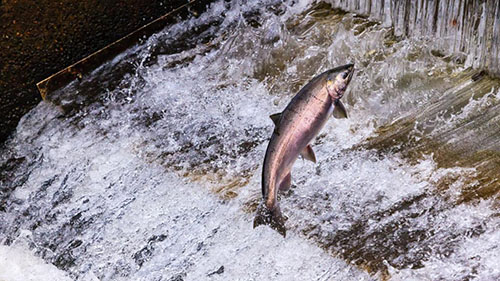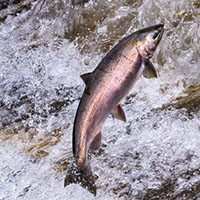— from Colleen Keltz for Washington State Department of Ecology —

The Washington Department of Ecology is issuing a proposal to allow more water to spill over eight federal dams along the lower Columbia and Snake rivers. The move could help improve the survival of juvenile salmon migrating to the ocean, increasing the availability of food for the struggling Southern Resident orcas.
Ecology is responsible for regulating the levels of dissolved gases in the dam water. This temporary change for the 2019-2021 spring spill seasons at the dams would test the potential benefits for fish passage when higher levels of dissolved gases, mainly oxygen and nitrogen, are allowed. Dam operators could increase the amount of water they spill over the dams to help fish migrating downstream without reducing power generation.
“Helping more juvenile salmon survive the journey to the ocean is one of many steps we want to take to protect and restore salmon. Our hope is this will also support the recovery and sustained health of our orcas,” said Gov. Jay Inslee. “This is an important short-term action we can take to help inform our decisions about what will work over the long-term.”
“As always, science is our guide and we need to balance the potential benefits to juvenile salmon without too great of risk to other fish,” said Maia Bellon, director of Ecology. “We want to be intentional and informed about any actions that significantly alter this complex ecosystem.”
Ecology’s action is supported by Inslee’s proposed budget and is responsive to the new agreement for flexible spill operations for the dams. The Department of Fish and Wildlife, the Columbia River Inter-Tribal Fish Commission, and a coalition of the Northwest Sportfishing Industry Association, Columbia Riverkeeper, and Save Our Wild Salmon have all expressed support for this action.
An environmental impact statement provides extensive information on current available science, research, and data related to total dissolved gas. Drafts of the environmental impact statement and short-term modification are now available for public comment.
After reviewing the comments, Ecology will release the final environmental impact statement and make a decision on the short-term modification.
Additional information on this proposal is available on Ecology’s blog.
**If you are reading theOrcasonian for free, thank your fellow islanders. If you would like to support theOrcasonian CLICK HERE to set your modestly-priced, voluntary subscription. Otherwise, no worries; we’re happy to share with you.**








